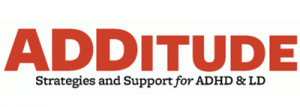“Knowing what to do next: Tips for better planning and prioritizing” by Dr. Sharon Saline Click here to read the article! 
Author: christina
YourTango: 5 Things To Try When Your Kid Says ‘No!’ To Everything
Reducing Regret as an ADHD Adult with the 4R’s
 Do you live with regrets? Regrets for things that you’ve done or things that you wish you had tried? If so, you are in good company. Many adults with ADHD carry around feelings of sadness, remorse or disappointment over something that happened in their lives or something that they did. This regret often acts as a form of self-sabotage: it’s a way to put yourself down that prevents you from living more fully in the present. Since you can’t go back, what’s called for is learning how to accept your actions, forgive yourself for the mistakes you made and pursue opportunities or interests in new ways. In essence, pivot and focus on changing what you can and you’ll start reducing regret and improving resilience.
Do you live with regrets? Regrets for things that you’ve done or things that you wish you had tried? If so, you are in good company. Many adults with ADHD carry around feelings of sadness, remorse or disappointment over something that happened in their lives or something that they did. This regret often acts as a form of self-sabotage: it’s a way to put yourself down that prevents you from living more fully in the present. Since you can’t go back, what’s called for is learning how to accept your actions, forgive yourself for the mistakes you made and pursue opportunities or interests in new ways. In essence, pivot and focus on changing what you can and you’ll start reducing regret and improving resilience.
Enduring the many challenges that come with ADHD
When you have ADHD, weaker executive functioning skills frequently show up in daily struggles with verbal or behavioral impulse control, emotional regulation, organization, planning, time management and setting and completing goals. When you wrestle with these challenges over time, it can seem impossible to break old habits and create newer effective ones. To make matters more complicated, you may also criticize yourself for times when you yelled inappropriately, showed up late to an important meeting, missed a friend’s birthday or made a joke that fell flat. Perhaps you’ve engaged in knee-jerk reactions that you wish you hadn’t and lost work or meaningful relationships as a result. Shame and blame quickly set in and band together to lower your self-esteem and your confidence. Now you are living with intense, negative self-talk that seems impossible to change.
Reducing regret with the 4R’s
 As adults, though, you can change your behavior by mindfully adopting new skills that create new neural pathways to offer you choices instead of reflexively reacting. Over the years, you, like many others, probably learned to hide your vulnerability underneath defensiveness and anger. What you need are new tools to tolerate your big emotions, manage hurt and disappointment and stop being your own worst enemy It’s not easy, but it is possible to stop “horribilizing” the events in your life and your own actions and start “efforting:” taking incremental, small steps toward doing more of what works. Focusing on the 4R’s can help you reduce regret, nurture resilience and rebuild self-compassion.
As adults, though, you can change your behavior by mindfully adopting new skills that create new neural pathways to offer you choices instead of reflexively reacting. Over the years, you, like many others, probably learned to hide your vulnerability underneath defensiveness and anger. What you need are new tools to tolerate your big emotions, manage hurt and disappointment and stop being your own worst enemy It’s not easy, but it is possible to stop “horribilizing” the events in your life and your own actions and start “efforting:” taking incremental, small steps toward doing more of what works. Focusing on the 4R’s can help you reduce regret, nurture resilience and rebuild self-compassion.
The 4R’s for reducing regret:
1. Radical awareness:
Look at thwarted dreams or disappointing actions and name them. Track when, where and how pessimistic or antagonistic thoughts arise.
2. Recognize:
Identify what was going on in your life at that time. Consider environmental, psychological, social, school, work or family factors.
3. Repair:
Ask yourself what it might take to restore a relationship or situation. How can you make amends, listen to feedback with more interest and neutrality and be (more) accountable?
4. Reconfigure:
Based on comments from others and your own assessment of yourself, reflect on how you can alter reactions or behaviors that hold you back from creating satisfying connections or achieving personal goals. Work on shifting just one thing: something you’ve adopted over time that gets in your way or hurts others. This can be intentional or not. Don’t try to change your whole personality: that’s neither realistic nor achievable. Instead, keep it small and doable.
Reshaping regret takes time, practice and forgiveness
 Regret is a very powerful pattern to reshape. Changing it takes time and practice. Taking responsibility for your part with honesty and humility reduces shame and blame and leads to personal empowerment. It can be tough to be honest with yourself without judgment or to share your feelings and be vulnerable. That’s natural. Take it slow, and start with small things. Notice and validate your efforts by writing down at least one way that you responded differently each day–what went well. Focus on nurturing compassion for yourself, and start the progress of forgiveness–for yourself and towards others. Remember, we all do things we wish we hadn’t when we lack the personal or socioeconomic resources to make different choices in a given moment. Now you are shifting to new patterns of creating healthier coping strategies and living without less regret.
Regret is a very powerful pattern to reshape. Changing it takes time and practice. Taking responsibility for your part with honesty and humility reduces shame and blame and leads to personal empowerment. It can be tough to be honest with yourself without judgment or to share your feelings and be vulnerable. That’s natural. Take it slow, and start with small things. Notice and validate your efforts by writing down at least one way that you responded differently each day–what went well. Focus on nurturing compassion for yourself, and start the progress of forgiveness–for yourself and towards others. Remember, we all do things we wish we hadn’t when we lack the personal or socioeconomic resources to make different choices in a given moment. Now you are shifting to new patterns of creating healthier coping strategies and living without less regret.
Read more blog posts:
- Taming Emotional Triggers with an ADHD Brain: How to understand big feelings and respond differently
- ADHD and Self-Sabotage: 6 supportive strategies to help you feel more confident and reach more goals
- Family, Forgiveness and ADHD: Loving and letting go, during and beyond the holiday season
Watch on Dr. Sharon Saline’s YouTube Channel: https://youtu.be/AZGrbNjUGlo Handouts, Videos & More in Dr. Saline’s Store: https://drsharonsaline.com/product/shame/ https://drsharonsaline.com/product/whats-up-with-all-this-anger/
Psychology Today – Hyperfocus and ADHD: Productivity Superpower or Kryptonite?
New Psychology Today Article by Dr. Sharon Saline
Four strategies for understanding and managing hyperfocus successfully.
“Are you ever so engrossed in an activity that time seems to stop and nothing can tear you away? Does it ever seem like you lose a sense of where you are and what’s happening around you? This can be the experience of hyperfocus for many people with ADHD. Hyperfocus is defined as “a phenomenon that reflects one’s complete absorption in a task, to a point where a person appears to completely ignore or ‘tune out’ everything else.” Read the full article by Dr. Saline!
Women & ADHD Podcast: How do we know if it’s ADHD?
The ADHD & Women Podcast features Dr. Sharon Saline
“Dr. Saline and I talk about how her interest in ADHD as a psychologist was sparked by her own neurodivergent family. We also talk about inattentive type ADHD in childhood and why so many kids — both boys and girls — with inattentive ADHD end up overlooked and ultimately diagnosed with depression and anxiety instead of ADHD. We also talk about the adult diagnosis experience and the best ways for you and your doctor to determine whether you have ADHD as opposed to possibly another situational struggle.”






